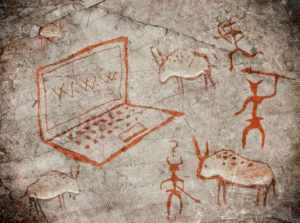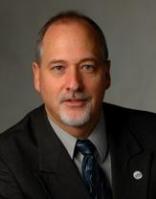
Image courtesy of the University of Michigan. All rights reserved.
These materials are from a past semester of this course at the U-M School of Information. For details and a syllabus of the current course, please see https://www.coursera.org/learn/internet-history.
The impact of technology and networks on our lives, culture, and society continues to increase. The very fact that you can take this course from anywhere in the world requires a technological infrastructure that was designed, engineered, and built over the past sixty years. To function in an information-centric world, we need to understand the workings of network technology. This course will open up the Internet and show you how it was created, who created it and how it works. Along the way we will meet many of the innovators who developed the Internet and Web technologies that we use today.
Course Audience
This course has no prerequisites and there will be no programming. Literally anyone can and everyone should take this course.
What You Will Learn
After this course you will not take the Internet and Web for granted. You will be better informed about important technological issues currently facing society. You will realize that the Internet and Web are spaces for innovation and you will get a better understanding of how you might fit into that innovation. If you get excited about the material in this course, it is a great lead-in to taking a course in Web design, Web development, programming, or even network administration. At a minimum, you will be a much wiser network citizen.
Join: Visit the course's site to register for and participate in this class.
Instructor: Charles Severance
Course Level: Undergraduate
Available on: Coursera
Syllabus
This syllabus includes both a calendar-style course outline as well as some notes about the course. Scroll down to see the notes about the course.
Note: The grading formula was changed from what is described in the second video because we added a peer-graded midterm exam after the video was taped.
Week 1 - July 23
- Introducing the course
- The Dawn of Electronic Computing
Assignment: Quiz
Week 2: - July 30
- High Performance Computing and its Impact
- Getting the first Internet (NSFNet) Funded
Assignment: Peer-Graded Reflection
Week 3 - August 6
- Inventing the World-Wide-Web at CERN
- The dark-ages of the World-Wide-Web
- The Web Bursts onto the Scene
Assignment: Quiz
Week 4 - August 13
- The Web Goes Commercial - Battle Lines Get Drawn
- Justice Triumphs - We Can Assume an Open Web
- Commerce Moves to the Web - Amazon, etc.
Assignment: Quiz
Peer-Graded Midterm Exam
Week 5 - August 20
- A Layered Architecture
- Internets and Packets
- Wireless, Wires, and Fiber Optics
- Electronic "Postcards" Wandering Around the World
Assignment: Quiz
Week 6 -
Moving up the Layered Architecture
Transporting all those "Postcards" Reliably
Assignment: Quiz
Week 7
- Application Layer: Why did We Build All this Anyways?
Assignment: Quiz
Final Exam
About the Course
Assessments
The purpose of the in-lecture questions and the weekly quizzes is to improve your understanding of the material. The in-lecture quizzes don't count at all. The weekly quizzes do count toward the "grade"but you can take them as many times as you like with your highest score is the one that counts. SInce the purpose of the in-lecture questions and weekly quizzes is to enhance learning you are welcome to discuss the questions with other students in the forums or elsewhere even while you are taking the quizzes.
The midterm and final exam are to be your own work. Please do not discuss the questions until after everyone has finished the two exams. After the exams are all in, you are welcome to discuss the questions with other students.
Peer Grading
We added two peer graded assignments at the last minute when the peer-grading feature became available in Coursera (that is why the recorded videos don't mention the midterm). The first assignment will be at the end of week 2 and will be basically a practice run for us all. The midterm at the end of Week 4 will also be peer graded.
Grade Computation (Updated)
The overall course grade will be weighted 60% on the non-exam grades and 40% on the exams. The mid term and exams will be equally weighted (i.e. 20% each). A "passing" score that earns a certificate is 75% overall. This grade formula is different than the video introduction states as the video introduction was taped before peer grading was available in Coursera.
Certificates
There will be some sort of certificate. We are still working on the exact format, details, and what the certificate will say.
Contacting the Instructor
With so many students it is not possible for the Instructor to directly respond to questions. Hopefully, you will answer each other's questions in the course forums. I will be in the forums from time to time monitoring for problems or issues. Make sure to vote problems or questions up in the forums if you want to make sure a question gets proper attention. You can also follow me on Twitter @drchuck - if you really need to contact me, probably the quickest way to get my attention for small things me is to mention me on Twitter - I will likely see it within a few minutes on my phone - unless I am sleeping or in an airplane.
Under Construction
This is the first time the course is being taught and so there will certainly be room for improvement. Feel free to suggest ways to improve the course.
About the Creators

Charles Severance
Charles is currently a Clinical Associate Professor and teaches in the School of Information at the University of Michigan. Charles also works with the IMS Global Learning Consortium as the IMS Affiliate Coordinator. Previously he was the Executive Director of the Sakai Foundation and the Chief Architect of the Sakai Project.
Charles is the author of the book, "Using Google App Engine" from O'Reilly and Associates. He also wrote the O'Reilly book on High Performance Computing. Charles has a background in standards including serving as the vice-chair for the IEEE Posix P1003 standards effort and edited the Standards Column in IEEE Computer Magazine from 1995-1999.
Charles is active in television and radio as a hobby, he has co-hosted several television shows including "Nothin but Net" produced by MediaOne and a nationally televised program about the Internet called "Internet:TCI". Charles appeared for over 10 years as an expert on Internet and Technology as a co-host of a live call-in radio program on the local Public Radio affiliate (www.wkar.org).
Chuck's hobbies include off-road motorcycle riding, karaoke and playing hockey. more...
- Ph.D. Computer Science, Michigan State University
- M.S. Computer Science, Michigan State University
- B.S. Computer Science, Michigan State University

Image courtesy of the University of Michigan. All rights reserved.
Jump to:
| Document Title | Creator | Downloads | License |
|---|---|---|---|
|
01: History - Dawn of Electronic Computing |
Charles Severance
|
||
|
02: Internet Technology and Security |
Charles Severance
|

